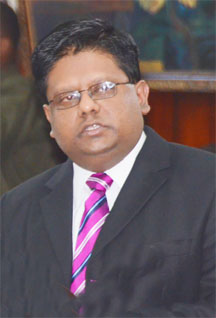The National Assembly passed last evening the Opposition piloted Fiscal Management and Accountability (Amendment) Bill 2013 almost three months after its debate was truncated following disruptive behaviour in the House.
The debate on the Bill yesterday saw fiery arguments on both sides on the merits and demerits of the Bill and whether or not it sought to take powers away from the Executive and confer same on the Public Accounts Committee with regard to the budgeting of certain agencies such as the courts and the Chambers of the Director of Public Prosecutions.
Taken to a vote, the Opposition majority defeated the Government and the Bill was passed. The debate had commenced on February 14, 2013.
The Bill was piloted by APNU Member of Parliament Carl Greenidge who said that the Bill seeks to ensure that agencies such as the Ethnic Relations Commission and the Audit Office receive a lump sum for their annual allocation.
The Bill is meant to give effect to Article 222 A of the Constitution with regard to the annual budget appropriation for constitutional agencies with a view to giving them financial autonomy.
“Right now, the Minister of Finance and his Finance Secretary may decide that exigencies can justify them not disbursing the money that is due to an agency. This House can approve an amount for the Judiciary and then that Judiciary can find itself not in receipt of the monies approved by this House because the Minister does not find it convenient or the Executive does not find it convenient. Can this be an independent agency? Can this be autonomy?” he asked.
“The Constitution requires that a lump sum be awarded to the entity after review by the Parliament. Not only must the failure to submit a lump sum be discontinued, but that after the amount is approved, it must be disbursed within a limited period of time otherwise no autonomy exists,” Greenidge said.

With respect to the Government queries as to who will be answerable for the actions of the agencies, Greenidge said that Government is confusing appropriation with implementation. “This House has a responsibility to receive, review and approve appropriations. What we are doing with respect to these agencies is requiring that the appropriations for these entities come directly to the House…that is what the Constitution requires,” he said.
“The guidelines of the Minister of Finance have to be respected [with regards to the agencies],” Greenidge said, saying that the agency would not be able to have just about any amount it wants.
“We have two purposes here…to ensure that the FMAA does not override Article 222 A of the Constitution and to ensure that the House is aware of what the agencies ask for. It is the House that determines what it receives and the House will know that once it has approved a sum for these particular agencies they cannot be modified,” he said.

He said that as regards the budgeting process, the idea is that as of now the agencies will prepare their estimates in accordance with the Minister of Finance’s guidelines. He said that the process touches in no way the responsibilities of the Executive but to ensure that the House carries out its functions in accordance with the Constitution.
“Can I accuse someone else of usurping my responsibilities when some of those responsibilities that I am currently exercising are unconstitutional?
So the idea [or] suggestion that we are seeking to take away responsibilities of the executive is entirely fictitious,” he said. “The responsibility for approving appropriation is the House’s not the Ministers,” Greenidge argued.
“The Executive would have made an input into fashioning the figures,” he said, noting that the Government will still be responsible for implementation and performance of the agencies.
He said that the Government has refused and failed to explain why it cannot implement what is in the constitution with regard to the agencies.
In presenting his case for the Bill to be withdrawn, Finance Minister, Dr. Ashni Singh posed the question who is to say when an agency should stop spending. “The fact of the matter is that this is not a trivial matter and the emotional arguments of the independence of these agencies have popular appeal,” he said.
“The fact of the matter is that the Constitution (confers) exclusively a responsibility of the executive certain fiscal and financial matters,” he said.
“Who do you hold responsible sir for the non-attainment of a fiscal outcome, surely you could not hold the executive responsible for non-attainment of a fiscal target, if you have a whole range of public sector entities funded by state resources but whose expenditure will be subject to no limit?” the Minister asked.
The Minister said that the framers of the Constitution clearly recognised the need for of the budget for these entities to be part of the process of the determination of the national budget. He asked for the Bill to be withdrawn but to no avail.
The Bill also proposes to extend Section 85 of the principal act to specify Ministers. The extant legislation says in Section 85, “An official who – (a) falsifies any account, statement, receipt or other record issued or kept for the purposes of this Act, the Regulations, the Finance Circulars or any other instrument made under this Act; (b) conspires or colludes with any other person to defraud the State or make opportunity for any person to defraud the State; or (c) knowingly permits any other person to contravene any provision of this Act, is guilty of an indictable offence and liable on conviction to a fine of two million dollars and to imprisonment for three years.”
The amendment sought for this section will include the word ‘Minister’ as it applies to an official.





